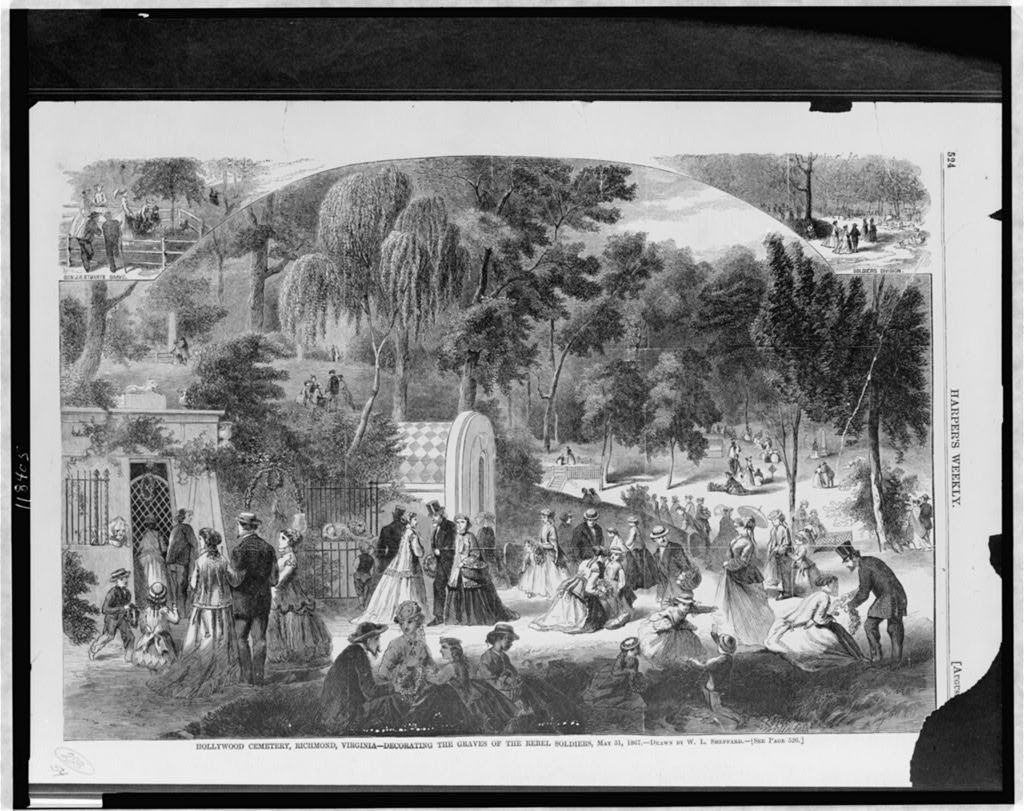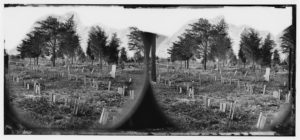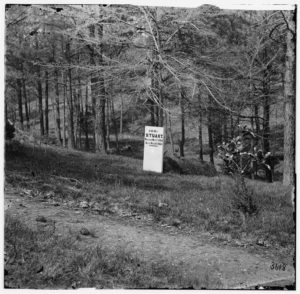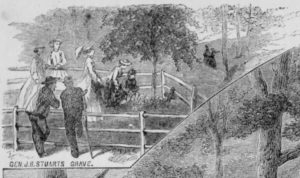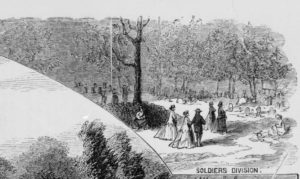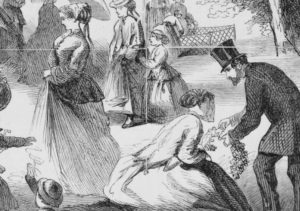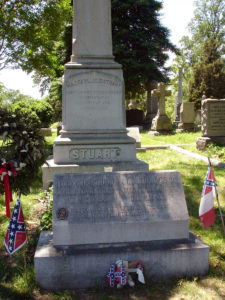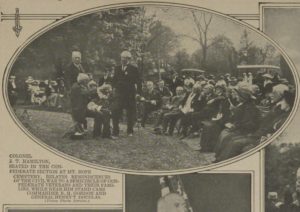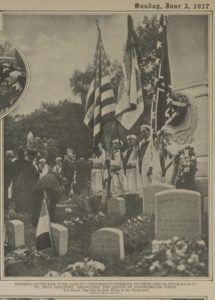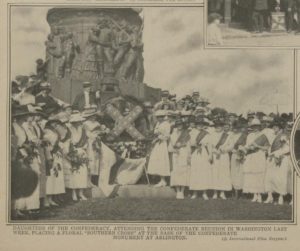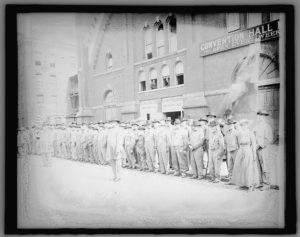150 years ago today thousands of Richmond residents converged on Hollywood cemetery to decorate the graves of Confederate war dead. Although a riot broke out in Richmond on May 11th, the Times’ HENRICO correspondent emphasized that the city was peaceful throughout the day.
From The New-York Times June 3, 1867:
VIRGINIA
Decorating the Graves of the Dead of the Confederate Army in Richmond.
From Our own Correspondent.
RICHMOND, Friday, May 31, 1867.
We have just returned from witnessing the outpouring of the inhabitants of a city of some 60,000 souls to ornament with flowers, garlands and wreaths the graves of 6,000 Confederate soldiers, which cover several acres of the largest and most beautiful of the cemeteries near this city. During the four years of the war, not only were many great battles fought a few miles from Richmond but here the principal hospitals of the Confederacy were located, and not less than 15,000 Confederate soldiers were rudely and hastily buried in the cemeteries near the city. When the war ended, it is impossible to conceive of anything more repulsive and hideous than were these fields of humble graves. They were unmarked, sunken and utterly neglected. denied a place in the national cemeteries the bones of these unfortunate braves were sometimes uncovered and exposed to view.
The citizens of Richmond were without means for the decent reinterment of the remains of these soldiers, but every heart bled at the lamentable condition of their last resting place. Both sexes and all classes were compelled by a natural sentiment of affection and pity to ornament by their own labors these sad and neglected cemeteries, and the result of their persevering efforts has been to some extent successful. While the voluntary labors of the people of Richmond have been constant and unceasing, it is also the annual custom of all classes on the 31st of May to turn out en masse to visit and decorate the graves of these dead soldiers of the South.Hence Hollywood Cemetery was for many hours to-day thronged in all its paths and avenues, with thousands of persons of all classes, ages and conditions, bearing floral ornaments for the graves of the Confederate soldiers. …
While that portion of Hollywood where lie many generations of Richmond’s best and wealthiest citizens is densely wooded and beautified with costly tombs, monuments and flowers, the section devoted to the dead of the Army of Northern Virginia is destitute of forest trees, and presents a dreary waste of unturfed graves. Side by side, scarcely a foot apart, lie six thousand soldiers. At a distance this field of graves looks as if it had been turned up by a huge plough in long furrows, and these furrows intersected by others at a distance of about eight feet. The footpaths are narrow and unornamented with shrubbery and the head-boards are often mere bits of shingle, containing the initials of the dead confederate and the number of his company and regiment. Although as yet unsodden, the graves during the last year have been “mounded” by the surviving companions in arms of the dead soldiers. Except when covered for a day with flowers and evergreens it is impossible to conceive of a more dreary spot than these acres of narrow, humble graves. On the last day of May, however, this bare and desolate spot is made beautiful by the hands of thousands of Southern men, women and children. The labor of ornamenting these graves is prosecuted with an enthusiasm which all ranks, ages and conditions of life alike feel.
Richmond, with its treasures of flowers and evergreens, cannot supply the demand for wreaths. There is not this morning, we suppose, a single flower left upon its stalk in Richmond or its environs. … Troops of little girls, beautiful as angels, traversed the city gathering every flower which bloomed in our gardens. Wagons, carts, hampers and baskets were all called into requisition to convey these offerings to the Cemetery. Released from their schools, thousands of children of both sexes, could, from an early hour until midday, be seen ladened with flowers, wreaths and crosses of evergreens. …
At the gates of the cemetery, beneath temporary awnings of weather-stained canvas, and from behind rude counters, perspiring freedmen drove a roaring business in cake, lemonade, oranges, cherries, ginger-pop, and other unhealthy looking luxuries.
Very few negroes, however, entered the gates of the Cemetery, and those who did were for the most part nurses and servants bearing flowers for their employers. I noticed a half-dozen handsome, modest-looking quadroon girls placing flowers upon the graves of the Confederate soldiers; but these were exceptional cases. By 10 o’clock the “Confederate section” was swarming with well-dressed men, women and children, busily decorating the unturfed, sun-baked and unshaded graves. Bronzed veterans of the armies of LEE and JACKSON mingled with old men and young children in this work.
Sad, broken-hearted looking widows and mothers were there, with their habiliments of mourning contrasting strangely with the gay apparel of fashionable women, who looked as if they were strangers to grief. Doctors of law, medicine and divinity found a common field for their labors amidst these dreary grounds. There must have been 20,000 hands to-day busy with these graves.
The Confederate section for many hours seemed one great republic of sorrow. The work was done silently, decorously and without a word of anger. Orations in eulogy of the dead were expressly forbidden by the managers of the “Memorial Association.”
While thousands were engaged in thus garlanding the graves of those who lie buried in that portion of the cemetery dedicated exclusively to the dead of the Confederate armies, scattered through the grounds were hundreds of smaller groups of friends and relatives, covering with garlands the graves of those citizens of Richmond who were killed in battle. AS we walked through the beautiful grounds of Hollywood, and found in almost every private section a freshly decorated grave or some tearful, sorrowing and bereaved group of friends and relatives placing flowers over a tomb, it seemed as if from every household in Richmond a son had gone forth and laid down his precious young life for the “late Confederacy.” Amid these sad, suggestive scenes we recalled the memory of many noble, brave and intelligent youths, the pride of their parents and friends, who went forth from this city full of hope and promise, and as the crimson tide of battle rolled around us, were brought back, young and beautiful even in death, and buried at Hollywood.
It is almost unnecessary to say that although for many hours Richmond poured its population into the “city of the dead,” until no one seemed left in the city of the living, yet the solemnity of the occasion was not marred by a single incident which we could regret. There were no angry and inflammatory harangues, no formal processions of ex-Confederate soldiers, no attempts to make the occasion subserve the purposes of “disloyal” and embittered feeling, and when the work of the day was done, and the thousands who were present had grown weary of wandering among the shady paths and avenues of Hollywood, they returned quietly to their homes. HENRICO.
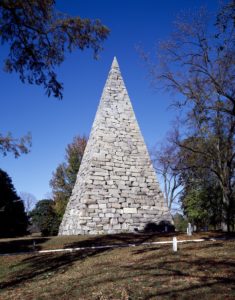
“90-foot stone pyramid honoring 18,000 Confederate enlisted men buried at Hollywood Cemetery, Richmond, Virginia”
____________________________________________________
Yesterday’s Show and Tell was about Memorial Day in New York City in 1917. It seems that Confederates were remembering in May (and early June) 100 years ago as well.

